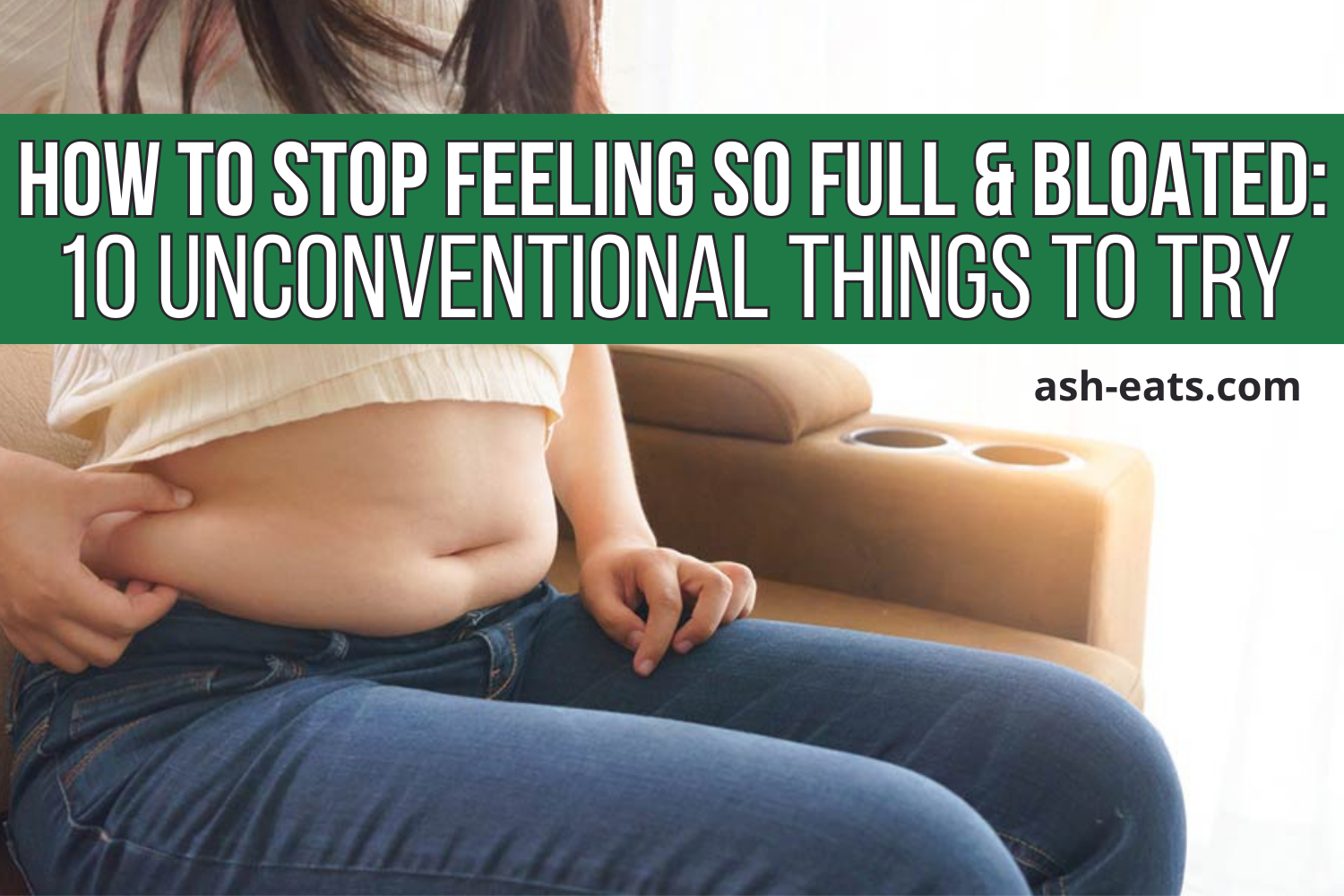
Published on August 31, 2021 by Ashley Rothstein
So, you’re wondering how to stop feeling so full and bloated. I get it.
Bloating plagued me for years. It drove me mad because I could never figure it out. As soon as I ate almost anything other than meat, I’d balloon up.
Here’s what I mean by ballooning…
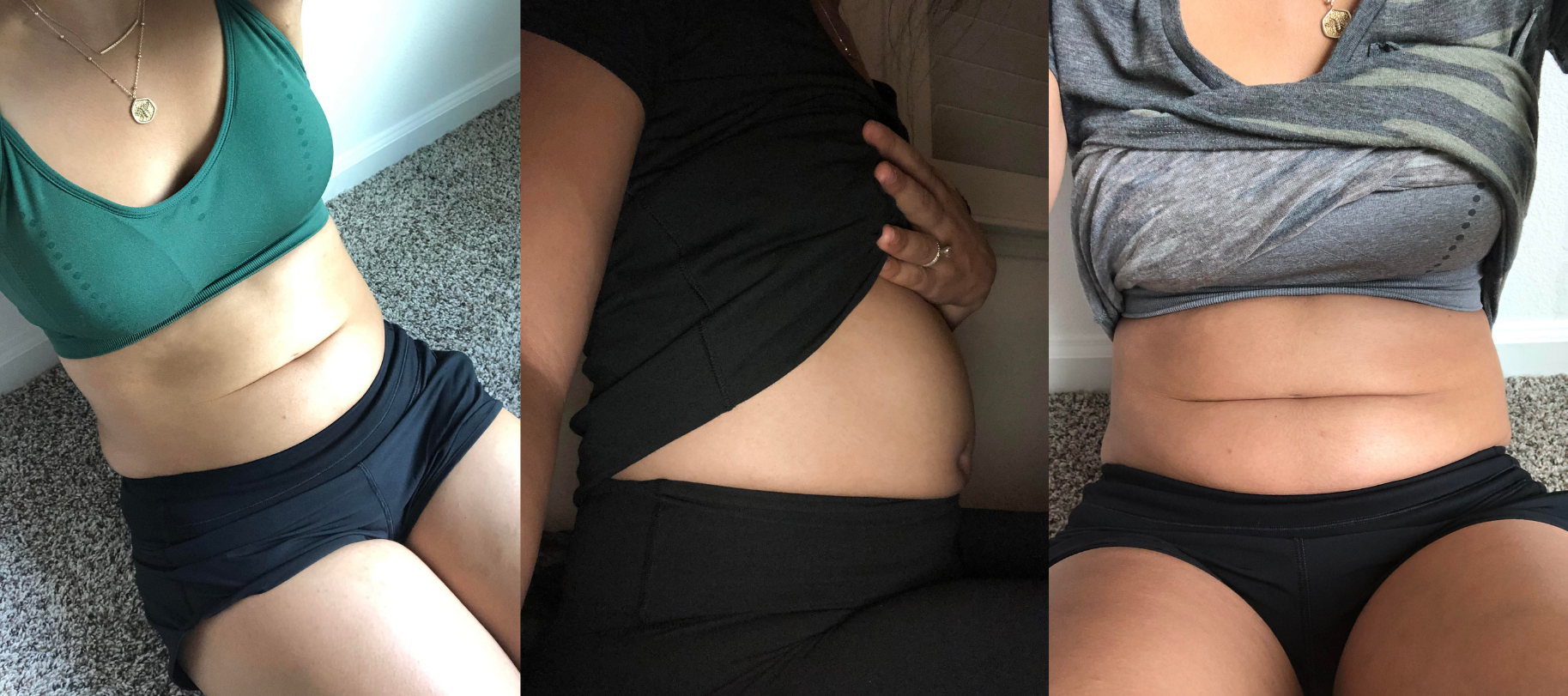
Some days, it felt like there was a rock in my stomach. Other days, a water balloon. Bloating ruined my life at times. It was painful, and I didn’t understand why it was happening, what caused it, or how to stop it. All I needed to do for Halloween was paint my skin white and I’d be the Michelin Man.
Along the way, I found a temporary solution: avoid carbs.
I was anti-carb for many years, and the bloating stayed away as long as I didn’t eat carbs (or as long as I ate very few).
I told myself that keto/carnivore was the answer and that carbs were the problem.
But…“watch what they do, and not what they say.” (This is one of my favorite quotes)
Every time I did carnivore or keto, I would feel like a superhuman the first few days, pretty good in the days or week after, and then I’d hit a wall. I upped my fat, electrolytes, ate different cuts of meat, cut out eggs/dairy, and other things, yet I kept hitting a wall.
Then I’d eat some carbs and feel life surge through me again.
My body was clearly asking for carbs, but carbs meant instantly ballooning into a painful bloat.
I was in a pickle…I wanted to eat carbs, but I didn’t want to bloat.
So I set out to find a way to do both.
After diligent trial and error, here I am eating carbs without bloating. Below are photos of me immediately after a meal that had liberal amounts of fruit. This is only about a month after photos 1 and 3 above. No weight loss, just a reduction in water retention.
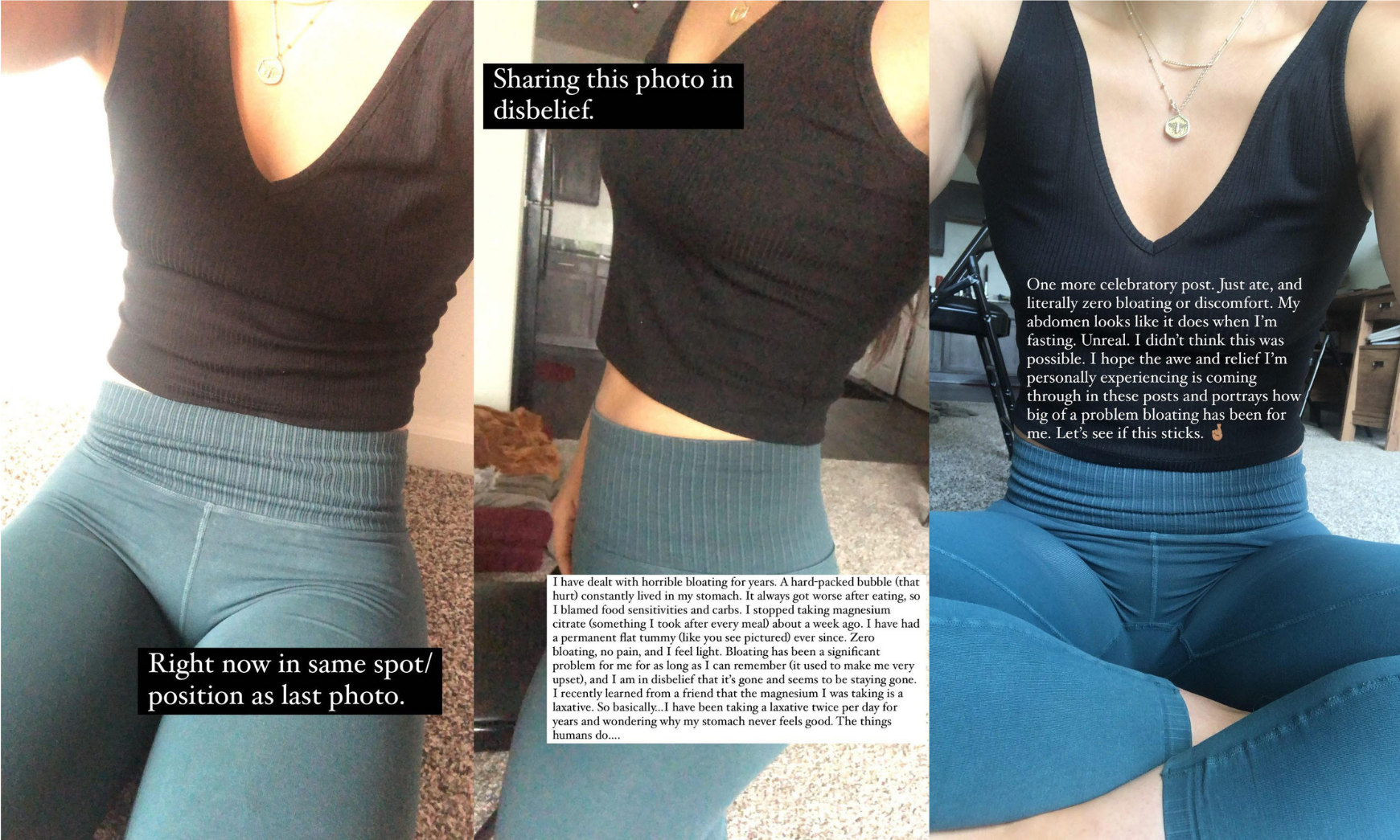
Now, I rarely bloat. If I do, it’s short-lived and I know what I need to do to get out of it. And it’s not limiting carbs.
In this post, I highlight 10 things that, over time, helped me beat the bloat and keep it away for good.
Read on to learn how to stop feeling so full and bloated.
1. Eat Animal-Based
When I landed on the animal-based eating philosophy and gave it a shot, I finally found the satiation I had been looking for.
- Paleo showed me how good eliminating processed crap made me feel.
- Keto showed me how good high fat made me feel.
- Carnivore showed me how good meat made me feel.
And the way I see it, these three diet philosophies came together to form the animal-based diet philosophy (originally coined by Paul Saladino).
Why eat animal-based?
- It doesn’t include the foods that make you feel like crap and bloat you: seed oils, processed foods, grains, legumes, processed sweeteners, and…
- It does include liberal amounts of nutrient-dense foods that leave you feeling light and satiated: muscle meats, organ meats, animal fats, eggs, low- and medium-toxicity plant foods.
If you deal with bloating, switching to an animal-based way of eating is a great place to start.
It’s evolutionarily consistent, and when done properly, void of dogma and restriction. My body naturally sank into this way of eating with little resistance.
To learn more about the animal-based way of eating, check out these posts here.
And if you need some recipe inspiration, you’re in the right place. I am an animal-based diet recipe developer, and I make animal-based comfort food recipes (breads, tacos, cookies, sandwiches, fried chicken, pizza, mac & cheese, and other yummy stuff). Check out my recipes here.
2. Salt, salt, and more salt
I feel like no one believes me when I talk about salt, but if you take anything from this post, let it be this section.
Salt. Eat lots of it. Drink it. And then when you think you’ve overdone it, eat and drink some more. I’m not kidding!
I get lots of messages from people who have problems with bloating. When I recommend they increase their salt intake, the response I usually get is “oh, I already eat a lot of salt.” Well, I’m here to tell you that you don’t.
I’m half kidding, but half not.
For me, liberally salting my food wasn’t enough. The turning point for me was when I started heavily salting my water and taking licks of salt throughout the day.
Drinking unsalted water no longer works for me. If I do (I’ve tried a few times)…instant ballooning.
To maintain my salt intake, I:
- add 1 tsp of salt to every 32oz of water I drink, 100% of the time
- keep a pile of salt on my desk and take licks of it throughout the day
- liberally salt my food
If you deal with bloating, radically increase your salt intake. I recommend starting with licks and slowly adding salt to your water.
Salt is my life force. If I…
- eat a little too much sugar (fruit), I up my salt
- feel tired, brain fog, or low energy, I up my salt
- am sad or blue, I up my salt
- feel nauseous, I up my salt
- can’t sleep, I up my salt
- feel a mild bloat coming on, I up my salt
For pretty much any mild ailment/deviation away from my baseline, I up my salt. It works nearly 100% of the time, especially for bloating.
And yes, in case you were wondering, this “up your salt” thing is against the mainstream “low salt” narrative. Read more about that here.
Instead of listening to the narrative, I encourage you to up your salt and see how you feel. If you’re a fan of Redmond Real Salt, I have a discount code (ASHLEYR for 15% off). Here’s a little hack to purchase salt efficiently (we recently started doing this and I’m really happy we did)…
Purchase one salt shaker, one (or a few) 10-lb buckets, and use the bucket supply to refill the salt shaker. Not only is it cheaper to buy in bulk, but you can use my code (ASHLEYR) and save an additional 15% off your order. Redmond offers free shipping for orders over $30 too, so if you buy at least one bucket, you’ll get free shipping.
UPDATE: Due to shipping issues, Redmond no longer offers 10-lb bulk buckets (sadly). However, while I was mourning the loss of the 10-lb buckets, I came across these 25-lb bulk bags on their website! They’re much cheaper per unit compared to the 10-lb buckets, and while I loved the buckets, I’ll always go for the better deal.
If the 25-lb bulk bags is too much salt for you, Redmond replaced the 10-lb buckets with 10-lb bags!
Note: They offer the 10-lb bags in fine and kosher and the 25-lb bags in fine, coarse, kosher, and powdered.
LMNT is also a great source of pre-packaged single-serving electrolytes. We use Redmond Re-Lyte too.
Note: When it comes to increasing salt, you may need to go slowly. If you go too fast, you may feel nauseous or create a laxative effect. And don’t chug salted water. Sip on it throughout the day.
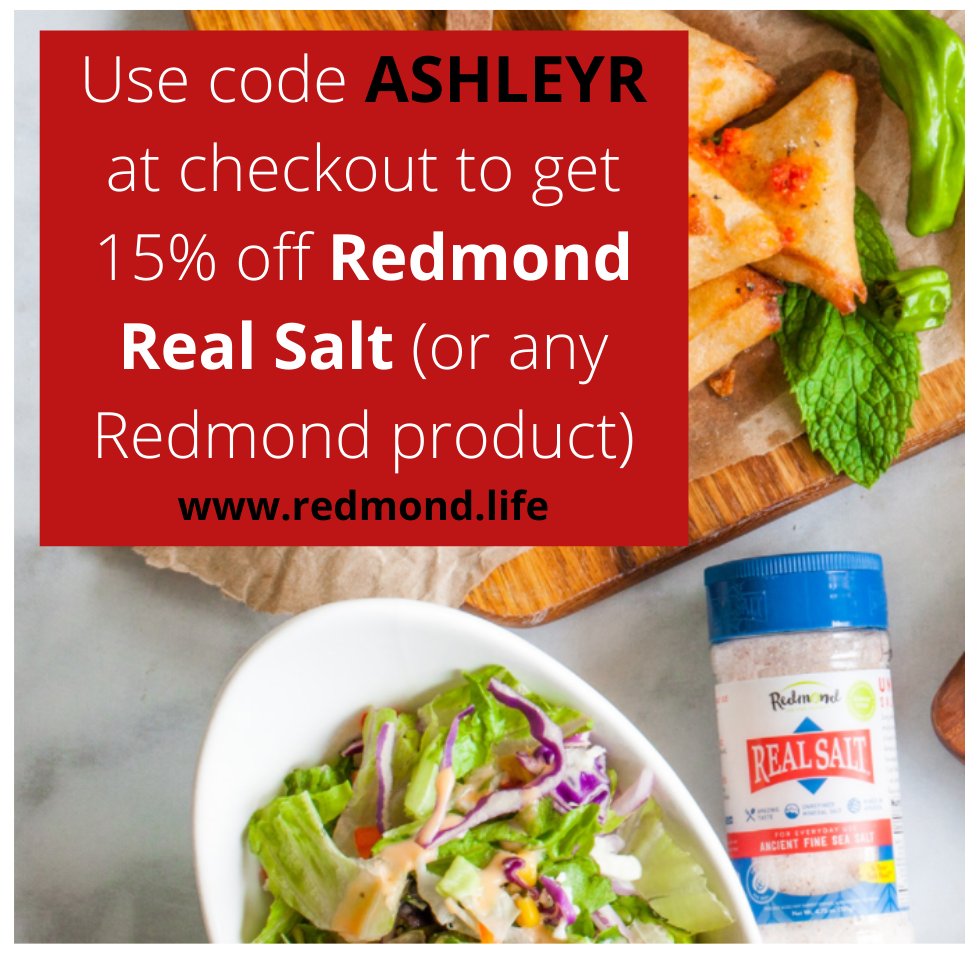 If you’re a fan of Redmond Real Salt, use my code ASHLEYR for 15% off your entire Redmond Real Salt order.
If you’re a fan of Redmond Real Salt, use my code ASHLEYR for 15% off your entire Redmond Real Salt order.
Click here to order.
3. Switch to real food supplements
If you take manufactured supplements, they may be contributing to bloating.
Manufactured supplements are isolated vitamins, minerals, or nutrients. They are synthetic and laboratory-made.
You can tell if a supplement is manufactured by looking at the ingredients. If the ingredient is the vitamin or compound itself, it is manufactured. For example, “Vitamin D” or “Zinc” or “B Complex.” Most vitamins and supplements on the market today are manufactured.
On the contrary, real food supplements are exactly what they sound like…real food.
Some examples…
Beef Liver + Bone Marrow. Fish Eggs. Desiccated Oysters. Fruit-based Vitamin C.
Real food supplements are evolutionarily consistent with the way our bodies are used to receiving and absorbing nutrients because food has been around for a long, long time.
And manufactured supplements are a very new/modern thing.
Ever experience the post-consumption stomach drop after taking your vitamins? Dull nausea? Brain fog? Butterfly stomach? Rock hard bloating?
I experienced all of those things when I took manufactured supplements, and I don’t experience any of these things with my real food supplements. When I take them, it’s like I just ate food.
No weird stomach sensations…and no bloating.
Consider ditching your manufactured supplements and switching over to real food supplements. If you’d like to learn how to transition, check out this post to learn more.
Want to learn more about my full real food supplement routine (and why you may want to consider ditching your manufactured supplements)?
Read this post here to learn more.
4. Don’t demonize carbs
As I mentioned at the beginning of this post, I used to restrict carbs to control my bloating.
This worked for some time, but prolonged periods of carb restriction messed up my electrolytes.
Electrolyte retention is dependent on dietary carbohydrate intake. When you restrict carbs for prolonged periods of time, your body has a hard time holding onto electrolytes. This is why most keto/carnivore people need to regularly supplement with electrolytes.
When I was keto/carnivore, I had a hard time holding onto salt. This was before I knew to radically increase my salt consumption, so being low carb without eating/drinking tons of salt, my body held on to the water I drank…hello water balloon stomach.
Now, as long as I eat/drink tons of salt, I can eat carbs liberally without bloating. Salt was the missing piece for me. And by carbs, I mean animal-based approved carbs…fruit, some root vegetables, and honey.
Also, for many women, carbs are necessary to maintain healthy menstrual cycles. In fact, it was usually the start of my luteal phase that I broke my carnivore and keto cycles because I felt miserable during that time of the month without carbs.
Carbs don’t necessarily equal bloating, and being anti-carb is usually a bandaid. It works for some people long-term, but not for everyone.
Upping my salt significantly helped me eat carbs without consequence again, helping me realize carbs weren’t what caused my bloating. In fact, carbs help control bloating as they help with electrolyte retention and keeping things in balance.
5. Take magnesium, and not just orally
If you experience insomnia, anxiety, depression, restlessness, infertility, irritability, fatigue, allergies, brain fog, high levels of stress, heart palpitations, muscle spasms, body odor, carb cravings, or really, basically anything that feels off in your body – you could probably benefit from upping your magnesium.
Magnesium also plays a crucial role in digestion and keeping bowel movements regular.
If you’re bloated, you’re probably also backed up.
Taking 500mg of this product (Magnesium Breakthrough) every day helps me maintain beautiful, easy, regular poops daily.
But don’t just stop there…
Consider transdermal magnesium as well.
I was skeptical about transdermal magnesium for some time, writing it off as a surface-level remedy. I never understood that it could help my body on the inside (or how) until I started using it, and was surprised when I experienced the benefits almost immediately.
To learn how to use transdermal magnesium, check out this post.
Want to learn more about oral magnesium vs. transdermal magnesium, the pros and cons of both, and how to figure out which method is for you?
Read this post here to learn more.
6. Move like a turtle
Our ancestors didn’t sit at desks in front of screens all day then go to the gym for an hour. They were constantly moving.
I think of the race with the turtle and the rabbit. The rabbit ran and got there in a short amount of time. The turtle walked the entire time.
Be the turtle.
Low intensity, consistent movement with bouts of heavier, intense exertion is more evolutionarily consistent with how our ancestors lived, and it’s also better for the body.
The body loves movement. It needs it. Our blood, lymph, muscles, tissues, and organ systems all require movement to function optimally…including our digestive system.
Think of a sitting car. If a car sits for a prolonged period of time, its fluids will cake up and its parts will clog. When it does run again, its functionality will be sub-par.
The body is similar. Regular movement aids digestion, ultimately controlling bloating.
Instead of “exercising,” try to not sit or be sedentary for more than 30 minutes at a time. Be the turtle…by engaging in low intensity, consistent, regular movement. Walks, stretching, yoga, hikes, jumping jacks, whatever…just get your body moving.
7. Limit histamines, FODMAPs, and potassium-rich foods
Throughout my food journey, foods high in histamines, FODMAPs, and potassium have been the most problematic when it comes to bloating.
Potassium-rich foods
If you are eating/drinking high amounts of salt, food high in potassium – like avocados, bananas, dates, sweet potatoes, squash, and dried fruits – shouldn’t be much of a problem.
But if you eat high potassium foods without increasing your salt, your body’s electrolyte ratio can get out of whack. And when this happens, you may feel pretty crappy and you may hold on to more water.
The solution? More salt or less potassium-rich foods.
FODMAPs
People with sensitive guts may also have sensitivities to foods high in FODMAPs, which can contribute to bloating. Meat, eggs, animal fats, and most dairy sources are low FODMAP. Squash, carrots, chives, cucumbers, pickles, zucchini, strawberries, pineapples, lemon juice, lime juice, cantaloupe, honey, and most herbs and spices (except onion and garlic) are also low FODMAP.
I find I feel the best when I eat low FODMAP.
Histamines
Histamines are sneaky. Lots of people – especially in the keto, carnivore, and animal-based communities – are likely dealing with histamine sensitivities and probably don’t know it.
Foods high in histamine (or foods that release histamine) – things like alcohol, fermented foods, dried fruits, avocados, aged cheeses, cured meats, bananas, chocolate, citrus fruits, nuts, and some teas – contribute to a host of problems in the body like digestive distress, gastrointestinal disorders, nausea, and anxiety.
When I eat high histamine foods, I feel like crap and swell up rapidly. I also find that I’m more bloated.
What to do
With histamines and FODMAPs, it’s the load, not the actual food, that’s problematic.
You may not need to eliminate the problem foods entirely or permanently, but limiting them or completely eliminating them for a specified time frame (say, 30 days) may be a good idea. Try this and see how you feel.
8. Don’t eat 3-4 hours before bedtime
Eating close to sleep will cause your metabolism to slow, and will therefore make it harder for your body to digest food.
Research shows this can lead to weight gain.
Anecdotally, the nights I eat close to sleep, not only is my sleep severely impacted, I also feel heavier, fuller, and puffier the next morning.
And when I’m sleep-deprived, I’m more likely to make sub-par food choices the next day, like start my day with food instead of salt water which then further contributes to the fullness.
All of these sub-par choices over time make a difference with digestion and bloating. They may be small, but they do compound.
If you’re trying to figure out how to stop feeling so full and bloated, stop eating 3-4 hours before you go to sleep. Do this for a week and see how you feel.
9. Get good sleep
When you get good sleep, everything is better.
When everything is better, you’re more likely to make better, mindful, conscious decisions.
I mentioned this in the previous section (and this is purely anecdotal), but days after I get suboptimal sleep, I notice I feel heavier, slower, and fuller – almost like a mild bloat or swelling in my body. Days after I get great sleep, I feel lighter and everything just moves and works better – including my bowels and digestion.
Research also shows that you’re more likely to make poor food choices when you’re sleep-deprived.
I love this list from NIH Medline Plus on Twelve Tips for Healthy Sleep:
- Stick to a sleep schedule. Go to bed and wake up at the same time every day.
- Avoid caffeine and nicotine.
- Don’t exercise late in the day.
- Avoid large meals and beverages late at night.
- Avoid medicines that delay or disrupt your sleep, if possible.
- Don’t take naps after 3pm.
- Avoid alcoholic drinks before bed.
- Relax and unwind before bed. Make it a ritual.
- Take a hot bath before bed.
- Make your bedroom dark, cool, and gadget-free.
- Wake up with the sun, get an hour of morning sunlight, and get out in natural sunlight for at least 30 minutes during the day.
- Don’t lie in bed awake. If you can’t sleep, do a relaxing activity until you get sleepy.
Prioritize getting good sleep and watch your entire life improve – including your digestive health, and in turn, bloating.
10. Become aware of your emotions around food
Binge eating or overeating can cause bloating. If you’re someone who deals with binge eating and/or overeating, you may find value in diving into your beliefs and emotions around food.
Tapping – a form of limbic system retraining – played a huge role in my transition out of binge eating, which ended up helping with my bloating too.
It sounds a little out there when you learn about it, but it really does work.
In a nutshell, the goal of tapping is to unstick yourself from your limiting beliefs (i.e. around food) by restructuring them through words while hitting certain acupuncture points on your body.
There are amazing success stories from folks who claim to eliminate chronic pain or unproductive behaviors with just one session of tapping. It’s pretty remarkable.
If you’re interested, I highly recommend checking out this free documentary. If you are interested in learning the technique and putting it into practice, buy the book.
The Tapping Solution Free Documentary
If you would like to learn more about my personal story with binge eating and tapping, check out my Instagram story highlight entitled “Binge Eating.”
I have other story highlights on my Instagram page that relate to the other topics I wrote about in this post, so you can check those out as well if they interest you.
Final thoughts
You came to this post to learn how to stop feeling so full and bloated, and I hope these tips were useful to you.
To recap, try these 10 things:
- Eat animal-based
- Eat/drink large amounts of salt
- Switch to real food supplements
- Don’t immediately demonize carbs
- Take oral and topical magnesium
- Limit sitting and participate in regular, consistent, low-intensity movement
- Limit histamines, FODMAPs, and potassium-rich foods
- Don’t eat 3-4 hours before bedtime
- Get good sleep
- Deal with your emotions around food
If you end up trying any of these things, drop me a line and tell me how it went.
I hope you are able to find relief from bloating. I dealt with it for years and know how horrible it is.
Send me an email (asheatsgood@gmail.com), reach out on IG, or comment below. Best of luck!
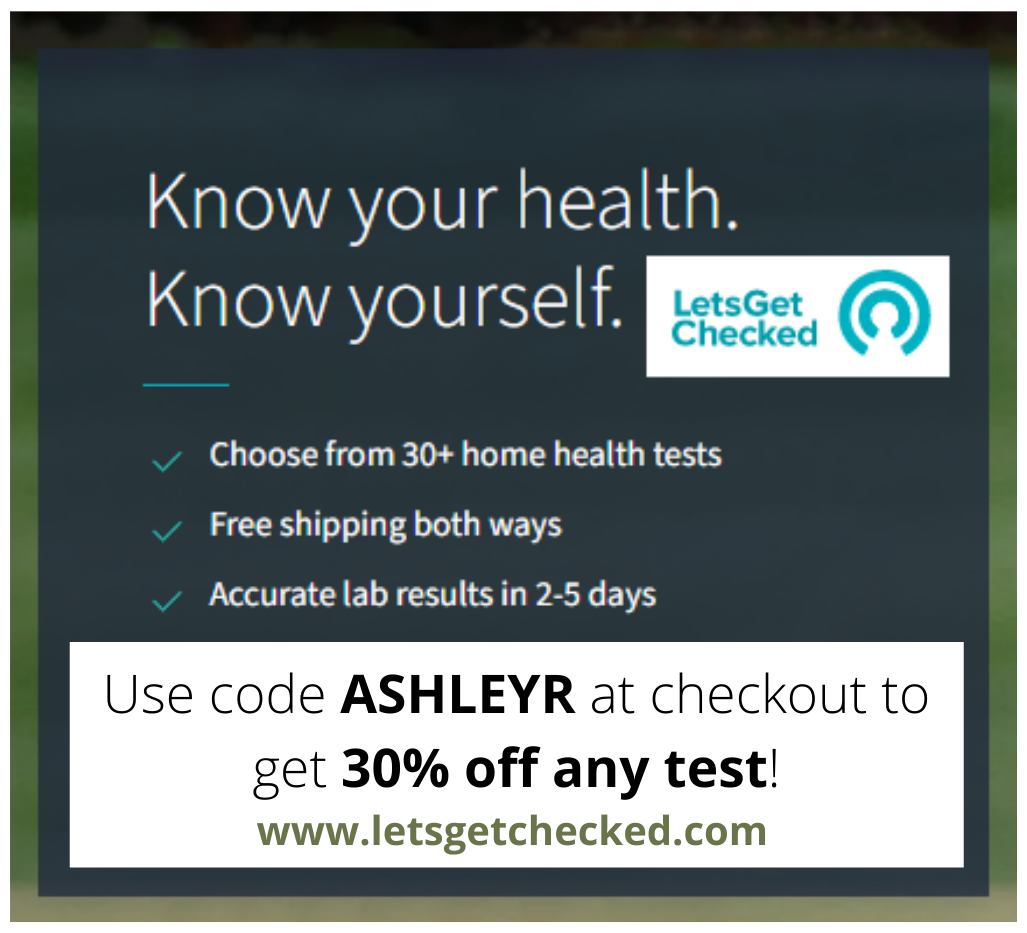


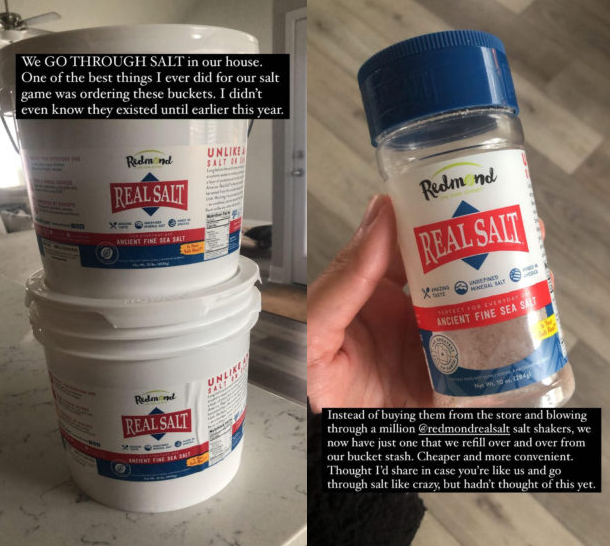
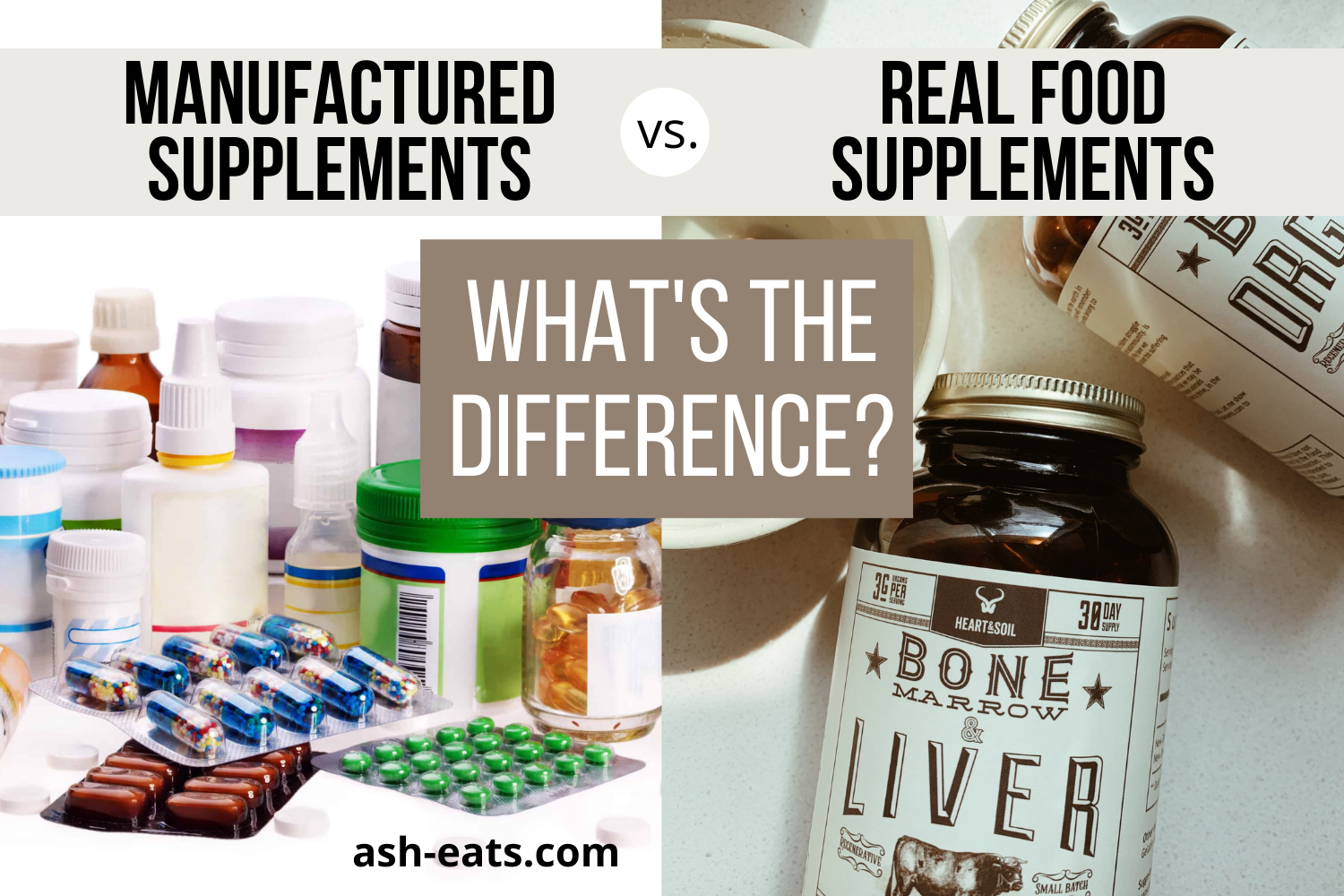
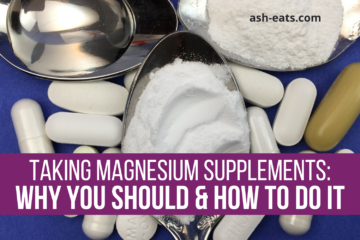
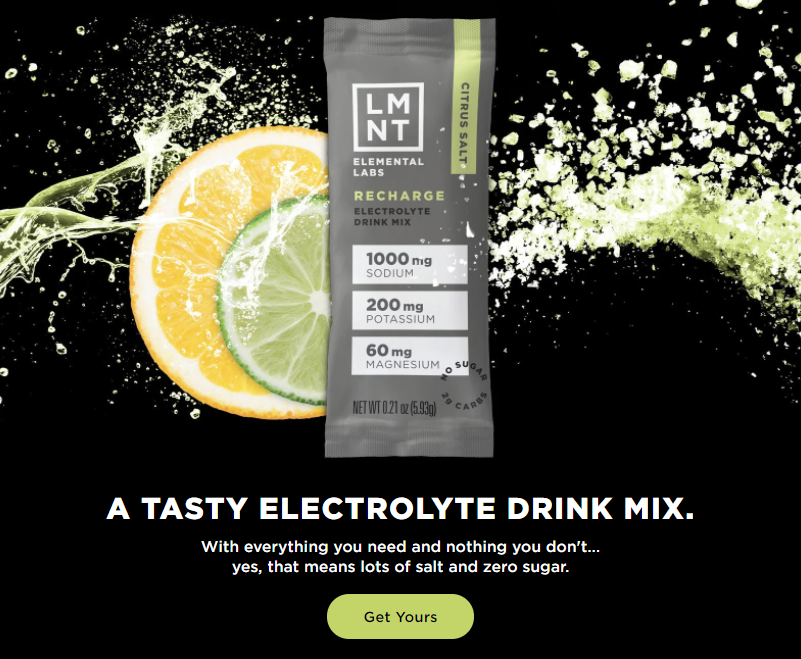

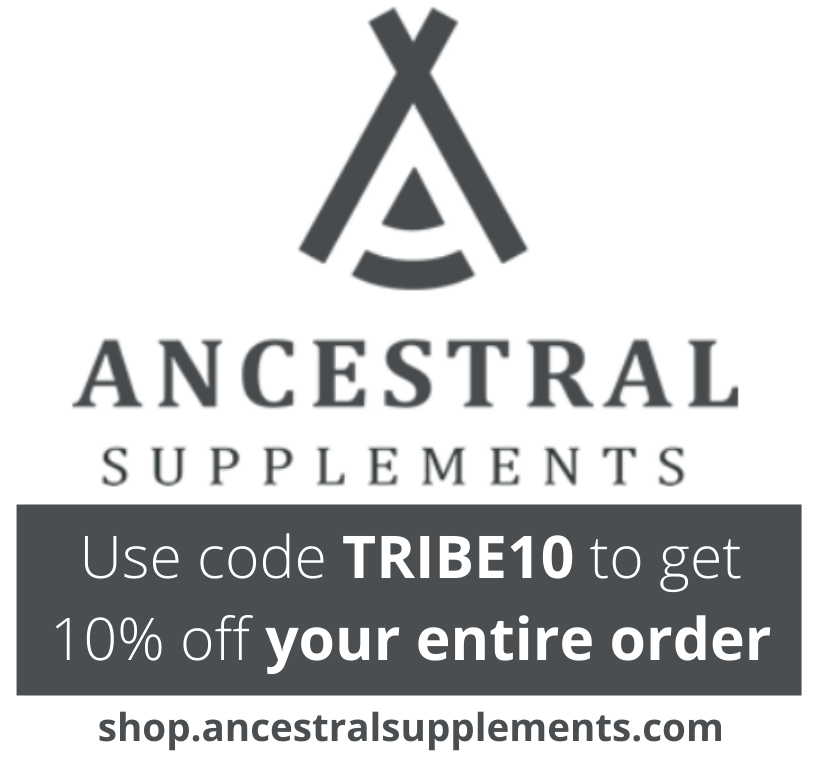

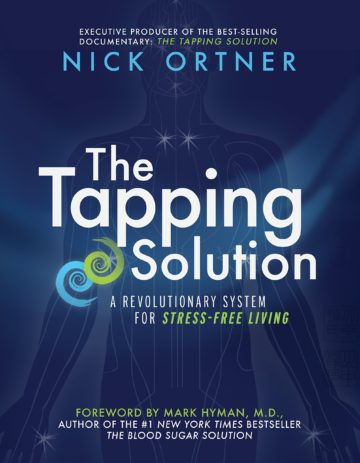

Great blog post, thanks for all the tips! I find it especially true in regards to not demonizing carbs. I have added a variety of fruits and root vegetables back in and feel much better than when I was strict keto and then carnivore.
It’s also still a work in progress for me not to eat big meals late at night. I’ve always eaten lighter meals early and heavier at night and I’m working to switch that around. I find I have better energy too when breakfast is my biggest meal and it’s fueling me the rest of the day.
I LOVE LOVE LOVE your articles and they are SO helpful!! Thnaks and keep them coming!